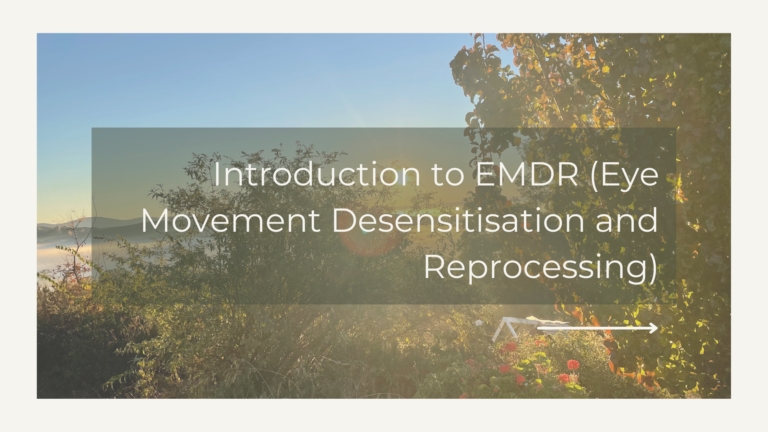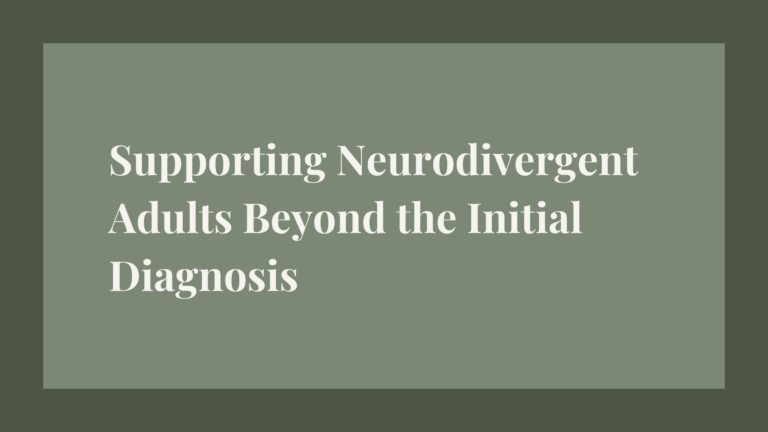Why Adults Seek an ADHD or Autism Diagnosis: Beyond Medication and Funding
As adults, we often feel like we’ve missed out on opportunities to understand ourselves fully, especially when it comes to neurodivergence like ADHD (Attention-Deficit/Hyperactivity Disorder)…
As adults, we often feel like we’ve missed out on opportunities to understand ourselves fully, especially when it comes to neurodivergence like ADHD (Attention-Deficit/Hyperactivity Disorder) or autism. While the prospect of a diagnosis doesn’t always open the door to medication or funding, many people choose to seek a diagnosis for other deeply valuable reasons—understanding their unique brain wiring, gaining clarity about their behaviours, and learning strategies to live more effectively.
1. Self-Identity and Validation
A diagnosis can provide a sense of clarity that many people have spent years seeking. For adults who have felt “different” or misunderstood, understanding the underlying neurodivergence can bring a profound sense of relief. It helps validate struggles that may have previously been attributed to laziness, lack of discipline, or simply being “quirky.” With a diagnosis, it’s easier to see that these traits are part of a broader neurological difference, and not a personal failing.
Many individuals who seek an ADHD or autism diagnosis describe the feeling of finally “coming home” to themselves. Understanding why certain tasks are more challenging, or why social situations feel overwhelming, can remove a great deal of emotional stress and self-blame. It can also foster a sense of community with others who share similar experiences. Knowing that you’re not alone, and that these behaviours or tendencies are not caused by a lack of effort, can be incredibly liberating.
2. Understanding Behavioural Patterns
When we have ADHD or autism, certain behaviours or tendencies can feel isolating or puzzling. From impulsivity to difficulty focusing, from sensory overload to social challenges, the daily experience can feel exhausting. A diagnosis offers an opportunity to step back and understand these behaviours as part of the way the brain is wired, rather than as shortcomings or personal flaws. This can lead to improved self-compassion, and allow individuals to be more patient with themselves.
A diagnosis also helps to differentiate behaviours from mental health conditions that may coexist, such as anxiety or depression, which can often mimic or mask the symptoms of ADHD or autism. Knowing the cause behind certain challenges opens the door to tailored strategies and interventions that can improve daily functioning and overall well-being. With this new understanding, people can feel more empowered to tackle life’s challenges with confidence and find solutions that work for them.
3. Developing Personalised Skills and Strategies
While medication or funding may not be part of the equation for everyone, the true value of a diagnosis lies in the opportunity to develop personalized strategies for living with ADHD or autism. A psychologist can work with clients to identify coping mechanisms and tools that fit their specific needs.
For example:
- Time management tools for those with ADHD: These might include using visual reminders, breaking tasks into smaller steps, and implementing structured routines.
- Sensory accommodations for those with autism: Identifying sensory triggers and creating spaces that help regulate sensory input can make a world of difference.
- Communication strategies for social interactions: Autistic adults may work on understanding non-verbal cues or expressing their needs in ways that feel authentic and comfortable.
- Mindfulness techniques for calming overstimulation: For both ADHD and autism, grounding techniques and relaxation exercises can reduce anxiety and help with emotional regulation.
Learning these strategies can lead to improvements in productivity, relationships, and general life satisfaction. It’s about acquiring the skills to navigate the world in a way that feels more aligned with one’s authentic self. With the support of a psychologist, adults can build an arsenal of techniques that help them thrive both personally and professionally.
4. Building Better Relationships
Understanding one’s neurodivergence can also enhance relationships. Partners, family members, and friends can better understand what a neurodivergent individual needs, leading to improved communication and stronger support systems. In therapy, individuals may learn how to communicate their needs more effectively, set boundaries, and advocate for themselves in both personal and professional contexts.
For many adults, this newfound self-awareness transforms relationships, reducing frustration and fostering more meaningful connections. Rather than constantly feeling like a square peg trying to fit into a round hole, individuals can create an environment in which their needs are acknowledged and respected. This can lead to greater emotional intimacy with loved ones and better collaboration at work.
5. The Empowerment of Self-Knowledge
Finally, a diagnosis brings empowerment. It gives people the tools to take control of their lives, rather than feeling at the mercy of their symptoms. With a clear understanding of their neurodivergence, adults can actively seek out resources, pursue therapies, and make informed decisions about how they want to live their lives. Whether they choose to make lifestyle changes, find workarounds, or embrace their unique qualities, self-knowledge is the first step in fostering a sense of agency and control.
By understanding the intricacies of ADHD or autism, individuals can approach the world on their own terms. They may decide to advocate for changes in the workplace or in social settings that help them function better, or they might choose to embrace their neurodivergence and pursue career paths or hobbies that align with their strengths. The diagnosis acts as a gateway to a fuller, more authentic life.
The process of self-discovery that comes with a diagnosis can also reduce the frustration that stems from constant misinterpretation of one’s behaviour. When you understand why you respond to situations the way you do, it becomes easier to build confidence in your decisions, reduce self-doubt, and make choices that support your well-being.
For adults seeking an ADHD or autism diagnosis, the goal is often much broader than simply gaining access to medication or funding. The desire for self-understanding, emotional validation, and practical tools to cope with life’s challenges are powerful motivators. A diagnosis offers a roadmap to better understand oneself, build effective strategies, and ultimately, lead a more empowered and fulfilling life.
If you’re considering seeking a diagnosis, remember that it’s a brave step toward embracing who you truly are and learning to live your life in a way that aligns with your strengths and needs. A psychologist can help you gain the clarity, skills, and confidence needed to navigate the world with a better understanding of your neurodivergence and the unique strengths it brings.
Ready to take the next step in understanding yourself?
Begin your journey toward self-discovery and empowerment.




